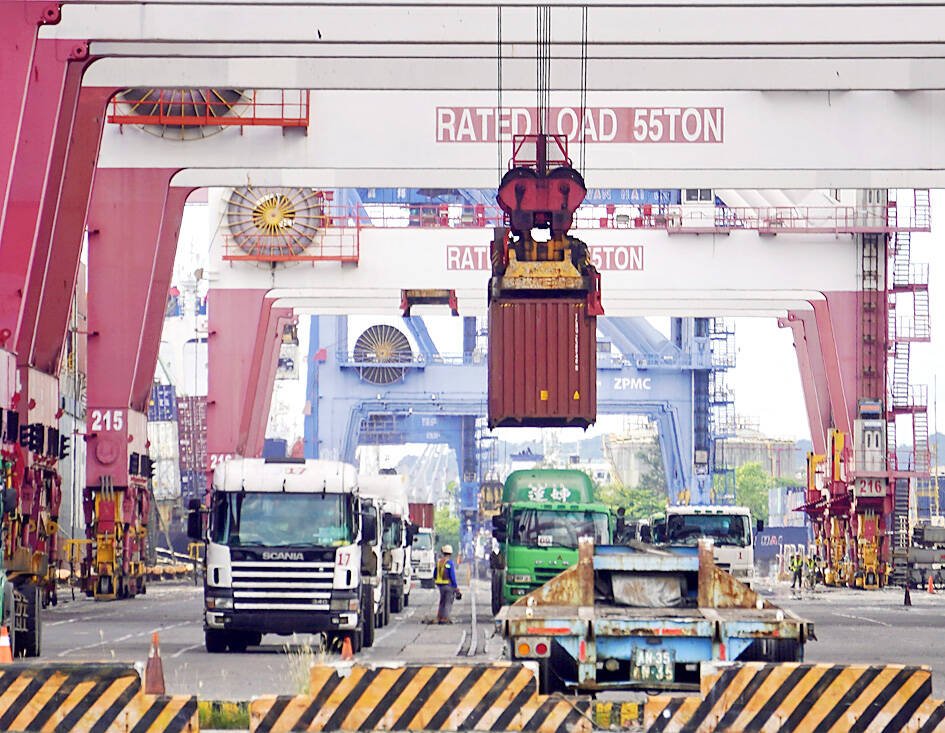Exports last month climbed 4.5 percent year-on-year to US$40.57 billion, the best performance for the same month on record, thanks to robust demand from artificial intelligence (AI) applications and the launch of new-generation smartphones, the Ministry of Finance said yesterday.
The figures marked the 11th straight month of annual expansion, albeit moderating from August’s 16.8 percent increase, as demand for non-tech products lost traction, the ministry said.
“The global economy has seen a wobbly and uneven recovery, but AI investment from US firms remains robust,” benefiting Taiwanese firms in their supply chains, Department of Statistics Director-General Beatrice Tsai (蔡美娜) told an online news conference.

Photo: CNA
Tsai is looking at growth of 5.5 to 8.5 percent year-on-year for this month, backed by the high sales season for technology products.
Overseas sales of information and communications technology products — mainly AI servers and graphics processing units — spiked 24.8 percent to US$10.31 billion, the ministry’s monthly report showed.
AI-server suppliers Quanta Computer Inc (廣達電腦), Wistron Corp (緯創) and Inventec Corp (英業達) yesterday all reported record-high monthly revenue for last month.
Outbound shipments of electronics, primarily advanced chips intended for high-performance computing and smartphones, rose 4.9 percent from a year earlier to US$17.06 billion, as the release of Apple Inc’s new iPhone series ramped up business at local providers of chips, camera lenses, printed circuit boards and other components.
By destination, shipments to the US soared 27.3 percent year-on-year, making it Taiwan’s second-largest trading partner, catching up with China, Tsai said.
Exports to China edged up 1.7 percent, as the vast economy struggles to revive sluggish domestic demand.
Operating conditions for non-technology sectors turned soft, the ministry said.
Exports of plastics, chemicals, minerals and transportation tools reported double-digit percentage declines, ending a brief recovery in August, it said.
A persistent supply glut continued to weigh on those sectors, Tsai said.
Imports advanced at a faster 17.3 percent pace to US$33.45 billion, giving Taiwan a trade surplus of US$7.12 billion, down 30.9 percent from a year earlier, the ministry said.
Inbound shipments increased mainly due to purchases of capital equipment and devices by local semiconductor firms, Tsai said.
Local companies imported high-bandwidth memory from South Korea for use in AI-related shipments, she said.
For the third quarter, exports grew 8.1 percent year-on-year to US$124.13 billion, beating the government’s forecast by 1.8 percentage points, Tsai said.
Imports expanded 15 percent to US$100.66 billion, missing the official projection by 0.28 percentage points, she said.
In the first nine months of the year, exports rose 10.2 percent from a year earlier to US$349.13 billion, while imports increased 10.1 percent to US$289.54 billion, the ministry said.

Intel Corp chief executive officer Lip-Bu Tan (陳立武) is expected to meet with Taiwanese suppliers next month in conjunction with the opening of the Computex Taipei trade show, supply chain sources said on Monday. The visit, the first for Tan to Taiwan since assuming his new post last month, would be aimed at enhancing Intel’s ties with suppliers in Taiwan as he attempts to help turn around the struggling US chipmaker, the sources said. Tan is to hold a banquet to celebrate Intel’s 40-year presence in Taiwan before Computex opens on May 20 and invite dozens of Taiwanese suppliers to exchange views

Application-specific integrated circuit designer Faraday Technology Corp (智原) yesterday said that although revenue this quarter would decline 30 percent from last quarter, it retained its full-year forecast of revenue growth of 100 percent. The company attributed the quarterly drop to a slowdown in customers’ production of chips using Faraday’s advanced packaging technology. The company is still confident about its revenue growth this year, given its strong “design-win” — or the projects it won to help customers design their chips, Faraday president Steve Wang (王國雍) told an online earnings conference. “The design-win this year is better than we expected. We believe we will win

Chizuko Kimura has become the first female sushi chef in the world to win a Michelin star, fulfilling a promise she made to her dying husband to continue his legacy. The 54-year-old Japanese chef regained the Michelin star her late husband, Shunei Kimura, won three years ago for their Sushi Shunei restaurant in Paris. For Shunei Kimura, the star was a dream come true. However, the joy was short-lived. He died from cancer just three months later in June 2022. He was 65. The following year, the restaurant in the heart of Montmartre lost its star rating. Chizuko Kimura insisted that the new star is still down

While China’s leaders use their economic and political might to fight US President Donald Trump’s trade war “to the end,” its army of social media soldiers are embarking on a more humorous campaign online. Trump’s tariff blitz has seen Washington and Beijing impose eye-watering duties on imports from the other, fanning a standoff between the economic superpowers that has sparked global recession fears and sent markets into a tailspin. Trump says his policy is a response to years of being “ripped off” by other countries and aims to bring manufacturing to the US, forcing companies to employ US workers. However, China’s online warriors